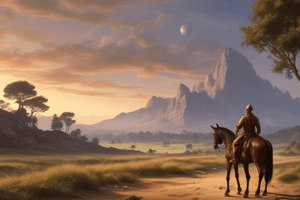Podcast
Questions and Answers
What was once a common fascination among historians?
What was once a common fascination among historians?
Dates
History is synonymous with dates.
History is synonymous with dates.
False (B)
What do people often wonder when they observe their surroundings?
What do people often wonder when they observe their surroundings?
Historical questions
What beverage did people develop a taste for over time, according to the text?
What beverage did people develop a taste for over time, according to the text?
Which of the following events is discussed in relation to time and history?
Which of the following events is discussed in relation to time and history?
What should we consider instead of fixing precise dates to historical processes?
What should we consider instead of fixing precise dates to historical processes?
Flashcards are hidden until you start studying
Study Notes
Importance of Dates in History
- Historians previously focused heavily on specific dates, sparking debates about coronations and battles.
- Common belief equated history with memorizing dates, resulting in perceptions of history as boring.
- History encompasses changes over time, examining past conditions and their evolution.
Historical Inquiry
- Engaging with history begins with curiosity about the past; common questions include origins of cultural practices.
- Everyday experiences can provoke historical inquiries, such as the introduction of tea, coffee, railways, and newspapers.
- These questions connect us back to the concept of time, demonstrating how history is intertwined with our current lives.
Nature of Temporal Understanding
- Time in history does not always conform to precise dates; significant processes can span long periods.
- For instance, the adoption of tea drinking developed gradually, lacking a singular starting point.
- Establishing British rule or the onset of the national movement cannot be pinpointed to exact dates but occurred over extended durations.
Conceptualizing Historical Change
- Historical events are complex and multifaceted, often evolving without clear beginnings or ends.
- Understanding history involves recognizing the gradual transformation of society, economy, and culture over time.
- The perception of historical events as fixed dates can lead to misunderstanding the dynamic nature of historical processes.
Studying That Suits You
Use AI to generate personalized quizzes and flashcards to suit your learning preferences.




